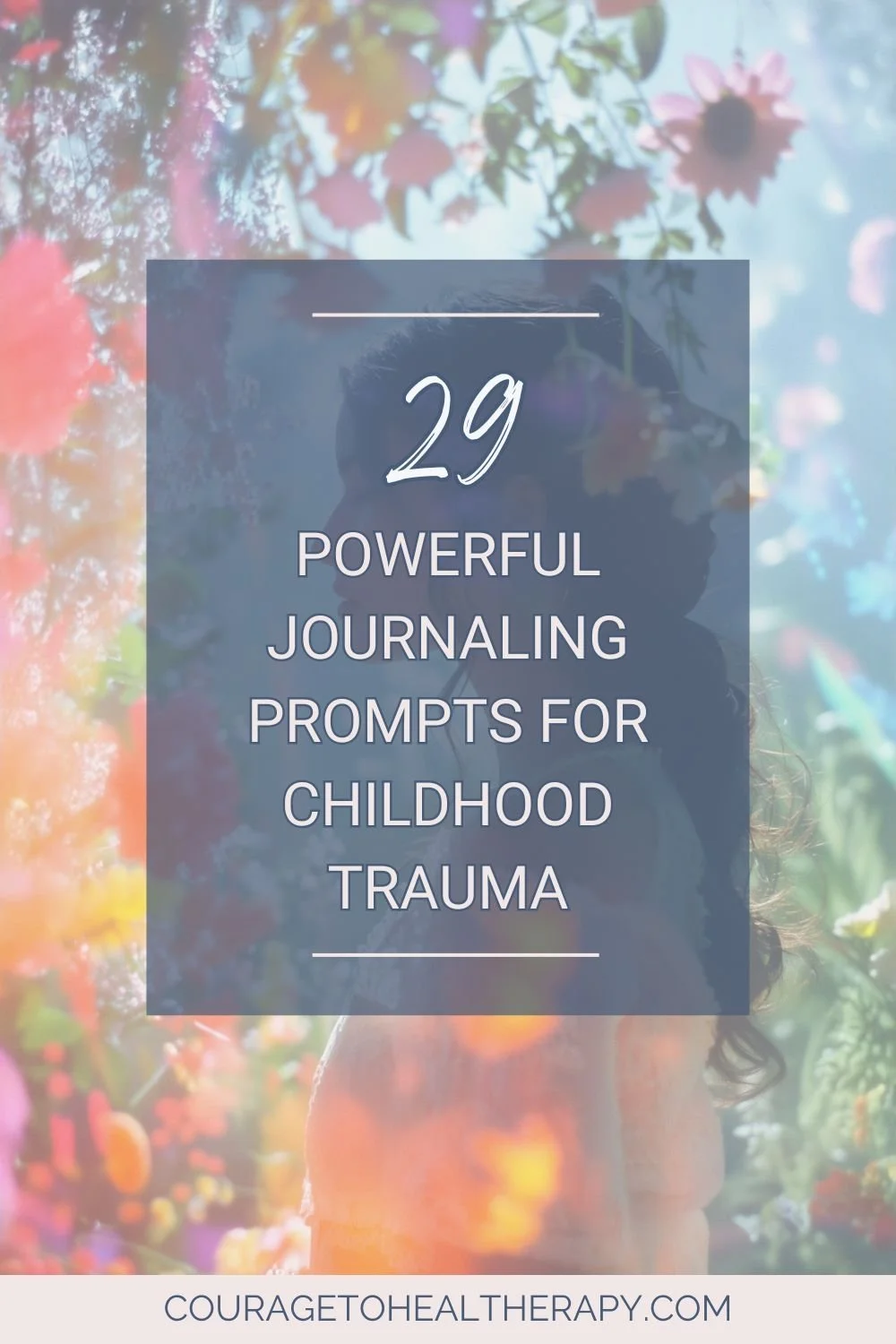29 Powerful Journaling Prompts for Childhood Trauma
There’s something quietly powerful about putting pen to paper—especially when the words feel hard to say out loud. Journaling prompts for childhood trauma offer a safe, private space to begin untangling the threads of your past. They invite you to gently explore what happened, how it felt, and how those early experiences may still echo in your life today.
Journaling is more than self-reflection—it’s a therapeutic tool backed by research and real-life transformation. Writing gives shape to emotions that once felt too big or too vague. It helps us slow down, witness ourselves without judgment, and begin to process pain we’ve carried for too long.
When it comes to childhood trauma, the healing often starts in small, quiet moments of truth. These prompts won’t demand more than you’re ready to give. Instead, they’ll meet you with compassion, guiding you inward—toward insight, validation, and the possibility of something softer.
Getting Started with Journaling Prompts for Childhood Trauma
Often, the roots of our present-day struggles stretch far beneath the surface, tangled in moments we didn’t fully understand at the time. That moment you were told to “stop crying,” the silence after you needed comfort, the way your body tensed when a door slammed – these experiences matter. They leave imprints. And part of healing means giving yourself the space to explore those imprints without judgment.
You don’t have to have all the answers. These prompts aren’t about fixing anything. They’re about honoring what was, so you can start to imagine what could be. Whether you write one sentence or ten pages, there’s no right way to do this.
All that’s required is honesty – and a willingness to sit with your story, even just for a few moments.
Let this be a beginning. A way to connect with the younger version of you who’s still waiting to be heard.
The First 13 Prompts
Before we can move forward, we often have to look back – not to stay stuck in the past, but to understand how it shaped the way we feel, cope, and relate today.
These journaling prompts for childhood trauma are designed to help you gently begin that process. They’re not meant to overwhelm you or dredge up pain without purpose. Instead, they serve as gentle doorways, inviting you to revisit your early memories with compassion, curiosity, and care.
#1. As a child, the thing that kept me up at night was…
This prompt helps surface the fears that lived in your body long before you had words for them. Naming them now – without shame – is a step toward offering that younger part of you the comfort they didn’t get then.
#2. If my childhood home could speak, it would say…
There’s something powerful about imagining your environment as a witness. This prompt lets you access memories through texture, tone, and unspoken energy – often revealing truths we weren’t allowed to say out loud.
#3. When I cried as a child, the response I longed for but didn’t get was…
This isn’t about blame. It’s about honoring your unmet needs. By identifying what you needed, you begin to validate your inner child and understand why certain wounds still ache today.
#4. When my mother’s/father’s anger filled the room, I felt…
Anger, especially from a caregiver, can feel like thunder when you're small. This prompt helps you gently explore how emotional safety (or the lack of it) shaped your nervous system and sense of self-worth.
#5. The way my mother/father looked at me made me believe…
Sometimes it’s not what was said, but what was seen – or not seen. This prompt invites you to reflect on how early expressions of love or rejection shaped the stories you tell yourself now.
#6. If I could sit my family down and make them understand just one thing, it would be…
This is your space to speak what was never heard. You’re not required to share it with anyone, but naming your truth is a powerful act of reclaiming your voice.
#7. I didn’t know it was shame back then, but I remember the moment I wanted to disappear…
Shame is sneaky. It often shows up before we know what to call it. This prompt helps you trace the origins of self-doubt with compassion – not to relive the pain, but to understand how deeply it shaped you.
#8. The one person whose love could have changed everything was…
Naming the person you ached for can feel tender, even raw. But acknowledging who mattered helps you grieve what wasn’t given and opens space to imagine how you might give that love to yourself now.
#9. I felt invisible around…
This prompt helps you reflect on emotional neglect, which can be just as impactful as overt harm. Being unseen doesn’t make you unworthy. Putting words to that experience can be a turning point in healing.
#10. I felt seen and safe with…
We often forget the good in the shadow of trauma. This prompt helps you remember those rare moments of safety, no matter how small. They matter. They remind you of what’s possible.
#11. I dreaded the moment when…
Fear often lives in anticipation. This prompt helps you name the patterns of dread that may still echo in your body today. By facing them with curiosity, not judgment, you create space to gently untangle them.
#12. The person I still carry resentment toward is… because…
This isn’t about staying angry, it’s about making space for honesty. Resentment is often a signal that something deeply mattered to you. You get to tell that story now, in your own words, at your own pace.
#13. A part of me still needs to hear: It wasn’t your fault when…
This is a re-parenting prompt – a chance to offer the words your younger self never heard. You don’t have to believe it right away. Just say it. Let it sit. Let it soften.
Going Deeper with Journaling Prompts for Childhood Trauma
Once you’ve begun to touch those early memories and emotions, you might notice what still lingers – quiet beliefs, lingering anger, old coping mechanisms that once kept you safe. These next journaling prompts for childhood trauma are here to help you explore that terrain more deeply.
They’re not just about what happened then, they’re about how it still lives in your body, your choices, your relationships. And just as importantly, they’re about what’s possible now.
This part of the work is where insight starts to meet action. Where you get to ask: What do I want to carry forward? What am I ready to lay down? What does healing look like for me?
Take your time. These prompts are invitations, not obligations. Let them meet you wherever you are – with gentleness, honesty, and the quiet courage to imagine something different.
Continue to explore your past and present with the following questions:
#14. Did I know I was being hurt while it was happening, or did I only understand it later?
Sometimes trauma hides in plain sight, disguised as "normal." This prompt creates room for you to explore how your awareness has evolved without judgment.
#15. What moment made me realize, “That wasn’t okay”?
Many people have a quiet reckoning years later. This question invites you to honor that clarity without rushing to label or fix anything.
#16. When I think of the word “victim,” what comes up for me?
This isn’t about labels, it’s about language and identity. Exploring your relationship with this word can reveal both tenderness and resistance worth sitting with.
#17. Is there someone I still carry anger toward? What is that anger trying to protect?
Anger often guards the most tender parts of us. This prompt helps you unpack your pain without forcing forgiveness or rushing past what’s still raw.
#18. What is my anger asking of me right now? Is it helping or hurting?
Anger isn't bad – it's intelligent. This question gently invites curiosity about how it’s showing up in your life, and whether it still serves the person you’re becoming.
#19. Do I want to carry this pain with me forever, or is there a part of me that’s ready to rest?
Letting go doesn’t mean forgetting. This prompt simply asks if you’re tired, and whether a softer path might feel possible – one day, if not today.
#20. What’s keeping me rooted in this pain right now?
Trauma responses are often protective. This question doesn’t judge what’s holding you back, it simply shines a kind light on it.
#21. Is there a part of me that’s ready to begin moving forward, even just a little?
You don’t have to leap – you can inch. This prompt makes space for progress to feel slow, uncertain, or even contradictory.
#22. If I were to take one tiny step toward healing, what might it look like?
Healing doesn’t demand huge gestures. Sometimes, it starts with something small: a boundary, a breath, a brave word. This helps make healing feel doable.
#23. If I’m not ready to let go yet, what do I need to feel safer first?
Holding on is often about protection. This prompt asks what your pain is doing for you, not in a blaming way, but with curiosity and care.
#24. In what ways is this pain shaping the life I’m living now?
It’s okay to admit when something from the past still echoes in the present. This prompt helps you name the impact, so it doesn’t quietly run the show.
#25. What has this pain taught me about who I am?
This isn’t about romanticizing trauma. It’s about noticing the strength, clarity, and self-knowledge that sometimes emerge in its aftermath.
#26. Can I pause for a moment and truly honor all I’ve survived?
You’ve been through things you never asked for – and you’re still here. This question isn’t about perfection. It’s about reverence.
#27. What does it look like to honor myself – not just in survival, but in softness too?
Honoring yourself can be a quiet ritual or a loud boundary. This prompt invites you to consider what kind of recognition your heart is craving.
#28. Is there still a part of me that needs more healing, more holding, more time?
You don’t have to be “healed” to be whole. This question gently makes space for the parts of you that still feel tender or unfinished.
#29. If healing could feel less like a task and more like an offering, what would I give myself?
This reframe moves healing away from pressure and toward nourishment. It asks: what might you offer yourself if you believed you were worthy of gentleness?
Healing from childhood trauma isn’t a straight path – it’s a winding, deeply personal journey. But every time you sit down with one of these journaling prompts for childhood trauma, you’re choosing to come closer to yourself. That matters. It’s brave. And it creates real, lasting shifts even if they feel small at first.
Let your writing be a soft landing place, a way to offer your inner child the compassion they didn’t always receive. You’re not just revisiting pain – you’re rewriting the story with truth, care, and agency.
If you’re feeling tender after this journaling session, that’s okay. You’re doing meaningful work. When you’re ready, I invite you to check out the blog post 10 Affirmations for Healing, Growth, and Becoming – a gentle companion to remind you that you’re safe, you’re seen, and you’re not alone. Or, you can explore how movement can help heal trauma in addition to writing.
***
Childhood trauma can often lead to the formation of Complex PTSD. If this is the case for you, please know that EMDR therapy can help heal complex trauma and improve your overall well-being and quality of life. Please check out Anna Khandrueva to see if she is the right therapist for your healing journey. Schedule a free online consultation today to see if we are the right fit for EMDR therapy in Broomfield, CO and online across Colorado.




